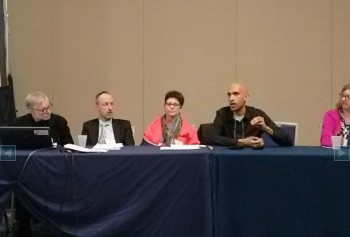CIES 2017: education unions shape the debate at global research conference
When top education researchers gathered recently in Atlanta, Georgia the voice of the teaching profession was loud and clear as Education International turned focus toward the role unions play in shaping technical and vocational education.

Challenging times for teacher unions
Against a backdrop of deprofessionalised and demoralised teachers around the world, Education International (EI) research on teacher unions in challenging times, carried out by Nina Bascia of the University of Toronto, was the focus of a panel discussion on “Teacher unions and university academics: Unlikely Bedfellows” at the annual Comparative International Education Society (CIES) conference. This year’s edition took place in Atlanta, Georgia from 5-9 March.
In her presentation, Bascia insisted that fruitful tensions for teacher unions need to be considered, such as combining industrialism and professionalism, shaping public and teacher discourse, working nationally and locally, working formally and informally, and working within and beyond the union.
“Teacher unions are leading the way with initiatives at the policy and professional learning and development level, providing support and professional engagement,” said EI’s Martin Henry, who, along with Nikola Wachter, represented EI in Atlanta. “This combines with an ability to act industrially and collectively to give teachers real leverage,” he added.
Henry underlined that teacher professionalism needs to be collaborative, aspirational, democratic and creative in the production of knowledge, and that teachers ability to initiate and implement change is central to their professionalism.
Challenges to be overcome in TVET
Conscious about the serious need for research on technical and vocational education and training (TVET), and the importance of an independent focus on it, EI commissioned a two-phase study which was presented to the conference. “Global Trends in TVET: a framework for social justice maps out the current state of play,” shows a TVET sector firmly grounded in the sustainable development goals, analysing the impact of various TVET systems on students and investigating of the impact on marginalised students.
While TVET is part of higher education, it is a more precarious and less recognised education sector, TVET professionals are less acknowledged for their contribution to the economy. Henry clarified that there exists a huge variety of approaches to TVET across countries, and TVET is increasingly moving into senior secondary education.
Source: Education International
- 440 reads
Human Rights
Ringing FOWPAL’s Peace Bell for the World:Nobel Peace Prize Laureates’ Visions and Actions

Protecting the World’s Cultural Diversity for a Sustainable Future

The Peace Bell Resonates at the 27th Eurasian Economic Summit

Declaration of World Day of the Power of Hope Endorsed by People in 158 Nations

Puppet Show I International Friendship Day 2020

